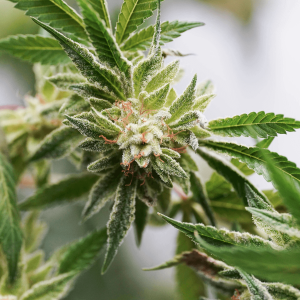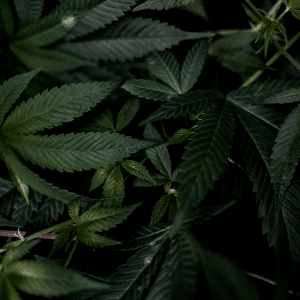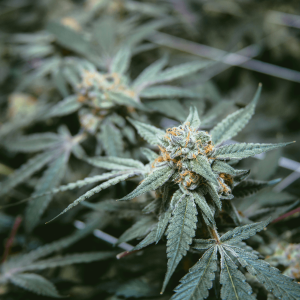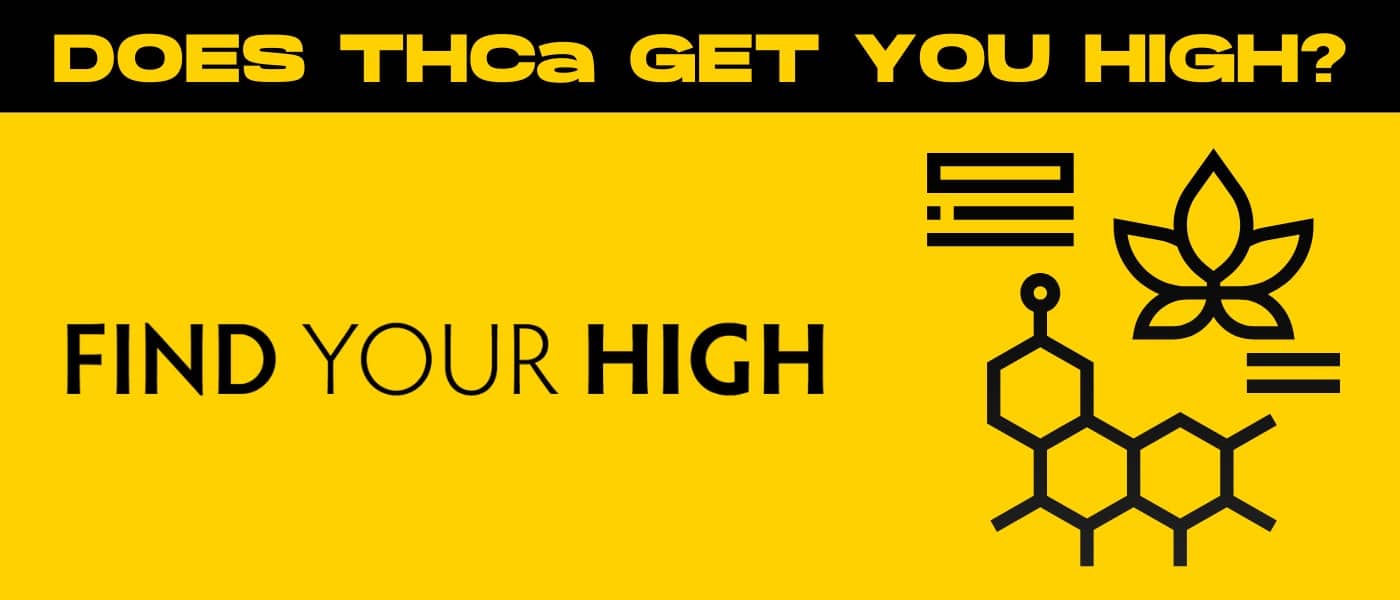THCa, or tetrahydrocannabinolic acid, is catching the eye of cannabis consumers and researchers alike. Although it’s one of the less flashy players when you think of cannabis compounds, it’s getting a lot of buzz for its potential benefits and unique characteristics. But does THCa get you high?
Unlike its well-known cousin THC, THCa doesn’t get you high in its raw form, which is a relief for those wanting to enjoy the raw plant without the mind-altering effects. This blog dives into the world of THCa, setting out to answer some burning questions about its effects, when it becomes intoxicating, and how it plays a role in the cannabis plant’s life cycle.
Along the way, we’ll shine a light on how THCa is different from high potency THC, what potential health benefits it might have, and why people are getting curious about this specific cannabinoid. Whether you’re a seasoned expert or just starting to learn about cannabis, this guide aims to give you a clear picture of what THCa is all about and why it is most definitely worth your attention.
What is THCa?
THCa, or tetrahydrocannabinolic acid, is a naturally occurring cannabinoid found in live and raw cannabis plants. It serves as the precursor to THC, which means that THCa has not yet been converted into its well-known psychoactive counterpart.
Unlike THC, THCa (fresh off the plant) is not intoxicating, allowing users to experience potential health benefits without the high. This property makes THCa particularly appealing to individuals looking for relief without the euphoria typically associated with cannabis.
The primary distinction between THCa and THC lies in their molecular structure. THCa contains an extra carboxyl group, which prevents it from binding effectively to cannabinoid receptors in the brain. As a result, the psychological effects affiliated with THC are absent in THCa, making it an intriguing compound for further research into its unique qualities and potential uses in holistic wellness.
How THCa is Formed
THCa formation is an essential part of the cannabis plant’s natural process. It begins with cannabigerolic acid (CBGA), the “mother of all cannabinoids,” which is converted into THCa through the action of an enzyme called THCa synthase. This enzyme catalyzes the reaction that transforms CBGA into THCa as the cannabis plant grows. During this process, THCA flower emerges as a prime example of the plant’s ability to harness simple organic chemistry to produce diverse and complex compounds.
THCa continues to develop in the plant until it undergoes a process known as decarboxylation, commonly triggered by heat from smoking or cooking. This process removes the carboxyl group from THCa, converting it into the more famous THC and enabling its intoxicating effects. So, does THCa get you high? Not as a raw food supplement, but if you’re consuming THCa, you’re likely applying heat, which transforms the compound into THC and produces the same high we all know and love.
Understanding the formation of THCa gives insight into the lifecycle of cannabis and emphasizes the distinct roles each cannabinoid plays in both botany and potential therapeutic applications.
THCa vs. THC: Key Differences
When it comes to comparing THCa and THC, there are several key differences that set these two cannabinoids apart.
First and foremost are their psychoactive properties. THCa is non-intoxicating in its raw form, which means it doesn’t immediately produce the euphoric effects that THC is famous for. This difference makes THCa an attractive option for those who seek potential therapeutic benefits without the high.
Structurally, THCa contains an extra carboxyl group that THC lacks. This extra piece is what prevents THCa from interacting with the CB1 receptors in the brain, resulting in no psychoactive effects.
So, let’s summarize…
Psychoactive Properties:
- THCa: Non-intoxicating
- THC: Causes euphoria
Structural Differences:
- THCa: Contains an extra carboxyl group
- THC: Lacks the extra carboxyl group, allowing it to bind to CB1 receptors
The effects of these cannabinoids on the body also differ. While THC is well-known for its psychoactive effects that might include relaxation and altered perception, THCa is believed to offer anti-inflammatory and neuroprotective benefits, though research is still ongoing in these areas.
The Decarboxylation Process
Decarboxylation is a chemical reaction that plays a crucial role in converting THCa into THC. This process happens when cannabis is exposed to heat, such as during smoking, vaping, or cooking. Essentially, decarboxylation removes the extra carboxyl group from THCa, transforming it into THC, which activates its psychoactive properties. Without this process, consuming raw cannabis won’t lead to the high typically associated with THC.
The beauty of decarboxylation lies in its simplicity yet importance. Without it, the potential effects of cannabis remain locked in its raw form. For those looking to benefit from cannabis without intoxication, consuming raw forms containing THCa might be favorable. However, for those who desire the full psychoactive experience, applying heat is essential to unlock the high potential of THC.
Understanding this process is key to making informed choices about how you consume your cannabis, whether you’re smoking, baking, or creating cannabis-infused products.

THCa in Raw Cannabis
THCa is abundant in fresh, raw cannabis, present in the plant material before any processing or heating occurs. When you talk about raw cannabis, you’re looking at huge amount of THCa, as this compound is plentiful before decarboxylation transforms it into THC.
Consuming raw cannabis is gaining popularity among health enthusiasts, with methods such as juicing or eating raw cannabis edibles being common ways to enjoy its benefits. Juicing raw cannabis leaves allows individuals to ingest THCa without the psychoactive effects associated with THC.
Raw edibles, like smoothies or salads incorporating the leaves, offer another tasty and nutritious option. This approach to consumption provides an opportunity to explore the potential therapeutic properties of THCa, such as anti-inflammatory or neuroprotective benefits, without any intoxicating consequences.
Does THCa Have Psychoactive Effects?
A frequent question about THCa is whether it induces any psychoactive effects. The straightforward answer is no, but let’s delve deeper to understand why.
THCa in its natural form doesn’t cause a high because its molecular structure includes an additional carboxyl group, preventing it from binding to CB1 receptors in the brain, which are responsible for the psychoactive effects experienced with THC. However, there’s often confusion about this part because once THCa is heated, as in smoking or cooking, it does convert into THC, which is psychoactive.
Scientific research supports THCa’s non-psychoactive nature, highlighting that it offers potential benefits without the euphoria typically linked with cannabis consumption. As such, understanding this scientific distinction helps users make informed choices, ensuring they achieve their desired outcomes, whether aiming for therapeutic benefits or simply exploring the possibilities that cannabis offers without the intoxicating buzz.
Health Benefits of THCa
THCa is gaining attention for its potential health benefits, primarily due to its anti-inflammatory and neuroprotective properties. While research is ongoing, early studies suggest that THCa may help reduce inflammation, which could be useful in managing conditions such as arthritis or other inflammatory disorders.
Additionally, THCa’s potential neuroprotective effects highlight its promise in supporting brain health, possibly offering protective benefits against degenerative diseases. Here are some potential therapeutic uses of THCa being explored:
- Anti-inflammatory benefits: May assist in alleviating inflammation-related conditions.
- Neuroprotective properties: Could offer support for brain health and protection against neurodegenerative diseases.
Overall, it’s clear that the wide range of potential applications keeps scientific interest alive as experts delve deeper into understanding THCa’s health benefits.

Ways to Consume THCa
For those interested in tapping into the potential benefits of THCa, there are several ways to consume it without the high associated with THC.
Raw consumption methods have become popular, as they allow individuals to enjoy THCa’s benefits directly from fresh cannabis. Juicing raw cannabis buds or blending them into smoothies are great ways to incorporate THCa into your diet.
For those seeking a more refined form, THCa tinctures and isolates are available. These products provide a concentrated dose of THCa, making it easy to measure and incorporate into your routine without psychoactive effects. Here are some ways to consume THCa:
- Raw methods: Juicing or blending fresh cannabis leaves into smoothies.
- Tinctures and isolates: Provide a concentrated form of THCa for easy consumption.
These methods offer flexibility and convenience, catering to various preferences and ensuring that users can access the potential health benefits of THCa on their terms.
THCa and the Endocannabinoid System
THCa plays an intriguing role in the endocannabinoid system, which is a complex network influencing many bodily functions.
Unlike THC, THCa doesn’t directly bind with cannabinoid receptors due to its unique structure. However, it still interacts with the system in various ways. THCa is believed to impact ECS indirectly by inhibiting certain enzymes, and promoting the balance and function of this system.
While its interaction is not completely understood, THCa may support the ECS’s ability to regulate processes like mood, hunger, and inflammation. This gentle influence offers users therapeutic benefits without psychoactive experiences, making THCa a subject of interest for those seeking health benefits without the high.
Legal Status of THCa
The legal status of THCa (Tetrahydrocannabinolic Acid) varies widely depending on the region. In areas where cannabis is legal for recreational and medicinal use, THCa is generally accepted, often falling under the same regulations as THC since it can be converted into THC through decarboxylation.
The 2018 Farm Bill, which legalized hemp and its derivatives, including THCa, provided a new framework for its acceptance. As long as THCa is derived from hemp with less than 0.3% THC, it is federally legal in the United States. In contrast, places with strict cannabis regulations may still treat THCa differently if not specifically addressed in legislation.
Looking forward, THCa’s non-psychoactive nature and its alignment with hemp legalization could pave the way for broader acceptance and clearer legal guidelines. As research continues to illuminate its potential benefits, there may be shifts in legislation that recognize THCa more favorably, echoing the growing interest in cannabinoids that offer medicinal properties without intoxicating effects.

Common Products Containing THCa
In today’s market, there are several popular products designed to provide the benefits of THCa. Among these are raw cannabis products such as fresh leaves and buds that can be used in juicing or smoothies. Additionally, THCa tinctures and isolates have gained popularity for their concentrated doses, making them easy to include in daily routines without psychoactive effects.
To ensure you’re getting high-quality products, consider these tips:
- Check for third-party testing: Reliable brands often have lab results verifying the purity and potency of their THCa products.
- Look for organic ingredients: Products made from organically grown cannabis ensure fewer pesticides and better overall quality.
- Research brand reputation: Customer reviews and industry recognition can offer insights into the reliability of a brand.
THC Tolerance and THCa
An intriguing aspect of THCa is its potential impact on THC tolerance. Since THCa itself is non-psychoactive, it does not contribute to increased tolerance when consumed. This can be beneficial for those who want to experience the potential therapeutic benefits of cannabis without affecting their response to THC.
When considering cross-tolerance, it’s essential to recognize that consuming THCa won’t inherently change your body’s tolerance to THC. However, if THCa is converted to THC through decarboxylation (heating), it may contribute to overall tolerance levels in the same way other THC products do. Thus, users interested in balancing their cannabis intake should understand these nuances.
Does THCa Get You High: THCa Research and Studies
The scientific community is increasingly focusing on the potential benefits of THCa, with recent studies providing promising insights. Early research highlights THCa’s anti-inflammatory properties, suggesting it could serve as an alternative for managing chronic inflammation and pain. Neuroprotective qualities have also been identified, indicating potential benefits in supporting brain health and protecting against conditions like Alzheimer’s.
Ongoing research aims to explore these findings further, along with THCa’s anti-emetic and appetite-stimulating properties. Several universities and research institutions are leading clinical trials to better understand how THCa interacts with the body and endocannabinoid system. These studies strive to identify the possible therapeutic applications of THCa, paving the way for new treatment options for a variety of conditions.
As more findings come to light, they could significantly influence how we perceive and utilize cannabinoids, opening up new avenues for medical treatments without the intoxicating effects traditionally associated with cannabis.
Risks and Side Effects of THCa
While THCa is considered non-psychoactive and potentially beneficial, it is crucial to be aware of possible adverse effects when exploring does THCa get you high.
Although rare, some individuals may experience mild discomforts like nausea or upset stomach when consuming THCa. Furthermore, current research on THCa’s interaction with medications is limited, so if you’re on prescription drugs, it’s wise to consult a healthcare professional before use. To ensure safe consumption, consider these safety precautions:
- Start with low doses: Gradually increase the amount to gauge your body’s response.
- Monitor your body’s reaction: Be attentive to any unusual changes or side effects.
- Consult a professional: Seek advice from a health expert, especially if you have underlying health issues.
Conclusion: Does THCa Get You High?
So, does THCa get you high? In summary, THCa presents a promising alternative within the cannabis industry, offering potential therapeutic benefits like anti-inflammatory and neuroprotective properties without the psychoactive effects of THC. It interacts uniquely with the endocannabinoid system and holds potential for managing conditions like chronic inflammation and supporting brain health. The current legal status in regions where hemp-derived products are accepted further boosts its viability.
Looking forward, THCa’s future in the cannabis industry appears bright as more research highlights its benefits and potential applications. As public interest in non-intoxicating options grows, suppliers and researchers are likely to focus on developing new THCa-based products and treatment avenues. This could lead to clearer regulatory guidelines and greater mainstream acceptance.
Ultimately, THCa could play a significant role in a diversified cannabis market, balancing medicinal properties with user safety and accessibility.
Does THCa Get You High? Frequently Asked Questions
1. Does THCa produce a high?
No, THCa does not produce a high. It’s the non-psychoactive precursor to THC, meaning it won’t cause the intoxicating effects usually associated with cannabis. When you consume THCa its raw forms, such as in fresh leaves or raw juice, it does not produce psychoactive effects. However, when heated, THCa converts into THC, which is psychoactive.
2. Are delta 9 and THCa the same thing?
Delta 9 THC and THCa are not the same, though they are related. THCa is the acidic precursor to delta 9 THC. In its raw state, THCa is non-intoxicating. Through decarboxylation—typically achieved by heating—THCa converts into delta 9 THC, the compound that produces the characteristic high of cannabis.
3. What does THCa do for the body?
THCa is being studied for a range of potential therapeutic benefits. It has demonstrated anti-inflammatory and neuroprotective properties in preliminary research, suggesting it may help manage chronic inflammation and support brain health. Additionally, THCa has shown promise as an anti-emetic and appetite stimulant, contributing to its potential as a treatment for conditions like nausea or appetite loss.
4. Which is stronger, THCa or Delta 8?
Comparing strength between THCa and Delta 8 THC depends on the context. THCa itself is non-psychoactive and won’t produce a high, whereas Delta 8 THC is mildly psychoactive, offering a less intensive high than delta 9 THC. In terms of psychoactive effects, Delta 8 is stronger than THCa. However, regarding therapeutic potential, THCa may have advantages due to its unique properties, though more research is needed to confirm these findings.
5. Is THCa legal?
The legality of THCa can be a bit of a gray area. Generally, THCa itself is legal in many places where cannabis or hemp-derived products are permitted, especially if it’s derived from hemp containing less than 0.3% Delta 9 THC. However, the laws can vary widely depending on your location, so it’s crucial to check local regulations. Since THCa converts to psychoactive THC when heated, some regions may have specific restrictions or labeling requirements. Staying informed about current legislation is a smart move if you’re considering using or distributing THCa products. Always ensure compliance with state and federal laws to avoid any legal hiccups.
6. Will THCa show up on a drug test?
THCa itself typically doesn’t show up on a standard drug test, which are generally designed to detect THC—the psychoactive compound resulting from decarboxylation. However, it’s important to note that if THCa is converted to THC through heating or other processes, the resulting delta 9 THC may be detectable. This means if you’re consuming a raw cannabis plant, the risk is low, but awareness is key if there’s any possibility of conversion. Keep in mind that drug tests can vary, and novel testing methods might include more comprehensive screening, so it’s always wise to be cautious and informed about the specifics of any drug testing you might undergo.





